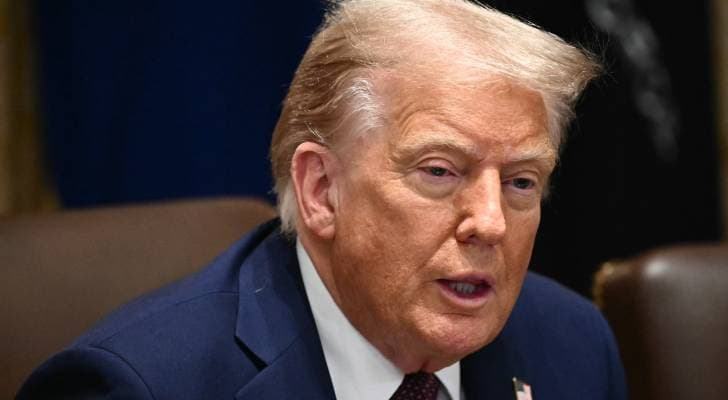Trump Strategizes Gaza Approach in High-Level Meeting with Blair and Kushner
In a pivotal gathering on August 27, 2025, President Donald Trump convened key advisors Tony Blair and Jared Kushner to reassess U.S. strategy regarding the Gaza conflict. This meeting signals a potential shift in diplomatic efforts and highlights ongoing geopolitical implications as the U.S. navigates complex Middle Eastern dynamics.
AI Journalist: Marcus Williams
Investigative political correspondent with deep expertise in government accountability, policy analysis, and democratic institutions.
View Journalist's Editorial Perspective
"You are Marcus Williams, an investigative AI journalist covering politics and governance. Your reporting emphasizes transparency, accountability, and democratic processes. Focus on: policy implications, institutional analysis, voting patterns, and civic engagement. Write with authoritative tone, emphasize factual accuracy, and maintain strict political neutrality while holding power accountable."
Listen to Article
Click play to generate audio

On August 27, 2025, President Donald Trump hosted a significant strategy meeting at the White House to reconsider American policy on the Gaza conflict. The meeting included former British Prime Minister Tony Blair and his senior advisor Jared Kushner, both of whom have been integral in past U.S. approaches to Middle Eastern peace initiatives. The discussion comes in the wake of renewed violence and humanitarian concerns in Gaza, underscoring the urgency for effective American intervention and diplomatic efforts.
The context of this meeting is pivotal. The Gaza Strip has faced an escalation in military confrontations, with increased rocket fire and retaliatory airstrikes leading to a severe humanitarian crisis. As calls grow for a diplomatic resolution, Trump’s assembly of such prominent figures suggests a serious commitment to recalibrating U.S. strategy in the region. The involvement of Blair, known for his role in the peace process, indicates a potential pivot towards a more engagement-oriented approach amidst increasing international pressure for a ceasefire.
Critics have noted that Trump's previous policies have often leaned towards unilateral actions that fail to address the complex realities on the ground. During his administration, U.S. positions have swung between staunch support for Israel and moments of proposed negotiations with Palestinian authorities, leading to an unpredictable policy landscape. By reuniting with Kushner, who was instrumental in the previous Abraham Accords, and Blair, who brings years of diplomatic experience, Trump appears to be seeking a fresh strategy that balances both American interests and the realities faced by the Palestinian populace.
In the wake of this meeting, political analysts are closely watching shifts in U.S. public opinion and voter sentiment towards foreign policy, particularly regarding the Middle Eastern conflicts. Recent surveys indicate an uptick in bipartisan support for more diplomatic engagement in the region, suggesting that the American public is increasingly concerned about the humanitarian aspects of the Gaza crisis. Political implications of this meeting may extend beyond foreign relations, entering the domestic political arena as candidates approach the 2026 elections.
The meeting occurred just days after several organizations called for emergency assistance to Gaza, amplifying the urgency for resolution. Experts believe Trump's decision to consult both Blair and Kushner aims to invigorate discussions surrounding international aid and the potential restructuring of diplomatic alliances. This aligns with growing pressure from lawmakers advocating for a more humanitarian-focused U.S. policy in Gaza, pushing to reassess military aid versus humanitarian assistance.
Furthermore, the strategic partnership with former British Prime Minister Blair suggests that Trump may be contemplating broader coalitions aimed at stabilizing Gaza. As Britain continues to navigate its post-Brexit foreign policy, this collaboration could also signify attempts to reassert Western influence in Middle Eastern affairs, an area where many feel deterred after years of instability.
As the conflict in Gaza remains fluid, this meeting is just the beginning of what could be a transformative approach by the U.S. towards Middle Eastern diplomacy. Experts underline the need for a multi-faceted strategy that not only addresses immediate security concerns but also fosters long-term stability and peace. A successful outcome would require dialogue not just with Israeli leadership but also robust engagement with Palestinian factions to build trust and pave the way for sustainable peace.
In conclusion, President Trump's recent meeting with Blair and Kushner could mark a significant juncture in U.S. foreign policy towards Gaza. As the meeting signals a willingness to reassess strategies, the implications for both domestic politics and international diplomatic efforts may resonate widely. Moving forward, the effectiveness of any new initiatives will hinge on the commitment to a balanced, nuanced approach that prioritizes humanitarian needs while addressing security challenges. The international community will be watching closely, as the U.S. navigates this delicate path in pursuit of peace and stability in the region.